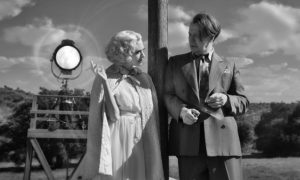It’s a sign of the times that in more and more movies with LGBTQ main characters, their queerness is just one of the things that define them.
Monsoon, about a Vietnamese-British software designer, Kit (Henry Golding), in his 30s, who visits Ho Chi Minh City (Saigon), the place of his birth, is a case in point. Kit is gay, and he has an affair in Saigon with a black American expatriate, Lewis (Parker Sawyers), but that is mostly irrelevant to his journey, only adding a layer to his alienation.

Kit’s family fled Vietnam with the “boat people” who risked all in the late ’70s and ’80s, after the Communist victory. He was six years old when he arrived in England and hasn’t been back since. He has brought with him the ashes of his parents — not because they wished it, but because he senses a need to reconnect. He’s not sure why.
Monsoon, which is rentable online for $12 via Waters Edge Cinema, is slow-moving, mysterious, and inconclusive, a European art film written and directed by Cambodian-British Hong Khaou (Lilting). The visuals and soundtrack are elegant and poetic: the chaotic movements and cacophony of modern, urban Vietnam don’t jibe with Kit’s childhood memories, and the salve he seeks is nowhere to be found.
He does find a childhood friend there, but the tension between them — sparked by jealousy and despair — is palpable. The only true connections he makes are with a young Vietnamese guide who was born after the American war, and with his American lover, who has his own wounds to heal.
Golding, who became a worldwide heartthrob in the Hollywood hit Crazy Rich Asians, evokes the sketchiness of Kit’s soul with extraordinary precision. Sawyers, who played Barack Obama in Southside With You, doesn’t have a lot to work with — the film is all about Kit’s eyes and ears. The movie is a wistful meditation on refugees and the loss of identity, one that Americans, due to their own history, might relate to.

Identity is completely beside the point of Ammonite, a new film written and directed by Francis Lee (God’s Own Country) that’s rentable for $20 on iTunes and Vudu. Lee’s subject is the British paleontologist Mary Anning, who lived in Dorset, on the raw coast of southwest England in the early 1800s. Because she was working class — the daughter of a carpenter — largely self-taught, and a woman, she was not allowed to join the Geological Society of London, and many of her fossil discoveries were credited to the men who bought them from her.
Yet she discovered so many, and her pioneering work was so significant, she could not be ignored. She made a living selling the fossils she dug up, and the work was dangerous, combing through landslides on the beach following winter storms.
Anning is played by Kate Winslet, an actor who fearlessly embraces her character’s flaws. Lee fleshes out Anning’s life in speculative ways, but together with Winslet, they build a remarkable and persuasive portrait of a historical figure whose work is not widely known.
In the movie, Anning is charged with the care of Charlotte Murchison (Saoirse Ronan), the melancholic young wife of a wealthy fossil enthusiast, a task she begrudgingly accepts because she needs the money.
The women fall for each other and begin a passionate affair. The stoic, obdurate Anning opens up to the girlish and sensitive Murchison. It’s curious to observe the public recognition of their relationship, though it’s mostly invisible. How it’s resolved is powerful and poignant, and largely a function of the class barriers of 19th-century England.
The Hollywood screenwriter Herman J. Mankiewicz was not gay, though he certainly was outré — a self-destructive philanderer, gambler, and drunk. His crowning achievement was the screenplay of Citizen Kane, the writing of which is the subject of David Fincher’s Mank, a new Netflix film available to stream by subscribers.

Mankiewicz functioned as a court jester to the Hollywood elite of the 1930s. His acid-tongued wit was prized, and he was friendly with newspaper baron William Randolph Hearst and Hearst’s mistress, Marion Davies, who starred in movies Hearst produced. By 1940, Mankiewicz had been spurned by Hearst and his career was essentially over. He pitched the idea for Citizen Kane — a thinly veiled takedown of Hearst — to Orson Welles, and Welles, a brilliant upstart theater director looking to make a splashy film debut, set him up in the Mojave Desert to write the script.
There is some controversy over how much of Kane’s screenplay is Mankiewicz’s and how much is Welles’s — they shared credit and won an Oscar for it. Critic Pauline Kael popularized the idea that it was pure Mankiewicz, which film scholars refute. Mank, which was written by Fincher’s father, Jack, supports Kael’s contention, but goes further, exploring the hierarchies of Hollywood and siding with leftist writers against the suits — MGM’s Louis B. Mayer and Irving Thalberg, and, of course, Hearst.
Fincher (Fight Club, Zodiac, The Social Network, Gone Girl) is a gifted director, and he shoots Mank in moody black and white, dense with crisp dialogue, more arch and artificial than genuinely witty or moving. Gary Oldman, as Mankiewicz, is riveting to watch, much like his impish Joe Orton in Prick Up Your Ears (and not his showy, Oscar-winning Churchill in Darkest Hour). Amanda Seyfried, as Davies, is revelatory — charming and uncommonly self-aware. The rest of the cast is competent, and Mank, as a story of genius, art versus life, and the class struggle, is a worthy effort. But unless you’re into Hollywood history, you may find it a tough slog.



